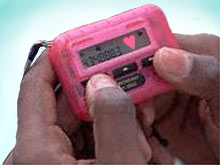 My friend Rob recently told me, with great excitement, about the love beeper. You program your availability and interests into the device, he explained, and it gives you and your potential mate a sonic nudge1 whenever you come within 30 feet2 of each other. "You tell the beeper, 'I'd like a quickie3,' or 'I'd like a serious relationship,'" Rob said, "and it beeps whenever someone programmed the same way walks by4. Isn't that a great idea?"
My friend Rob recently told me, with great excitement, about the love beeper. You program your availability and interests into the device, he explained, and it gives you and your potential mate a sonic nudge1 whenever you come within 30 feet2 of each other. "You tell the beeper, 'I'd like a quickie3,' or 'I'd like a serious relationship,'" Rob said, "and it beeps whenever someone programmed the same way walks by4. Isn't that a great idea?"
I thought he was joking, but sure enough5, the Lovegety ™ has been around since 1998. Like "Spinal Tap," it's big6 in Japan, where more than 1.5 million have been sold, according to the Lovegety Web site. The beepers come in blue and pink and in different frequencies to keep everything straight. Samesexers7 can use a similar device called, of course, Gaydar8, which comes with a vibrate mode.
Lovegety has a U.S. distributor but hasn't taken off9 here (Gaydar's done better stateside). The lack of enthusiasm doesn't surprise me, but Rob was so thrilled10 with the concept I asked another 10 people or so what they thought. The answers broke down11 consistently along gender lines. Guys thought it was a fine use of technology – if they can send a man to the moon, why can't they send one woman to my apartment? Women, myself included, were generally horrified12 by the idea.
For one thing, a love-beepered society would sound like a video game. Why add to the cacophony of cell phones and watch alarms and the TVs hanging from store ceilings13 like noisy fungus? And love-beeper din would be confusing, because of Lovegety's three different settings. "Chat14 mode," the Web site explains, means "maybe sitting down for a coffee and short chat, a trip to a fast food restaurant at most." Then comes "fun mode . . . a bit more serious than chat mode, but not as serious as friend mode!" "Friend mode" is turning it up to 11 – "the strongest statement15 you can make with your Lovegety." "Friend" setters are trolling for some sort of relationship, be it short- or long-term. ("Quickie mode," it seems, is a fantasy of Rob's.)
A 21-year-old interviewed when Lovegety first hit16 confirmed my suspicion about the din17. "We went to a 'Lovegety party' in Tokyo and were given Lovegeties at the entrance," the young woman told USA Today. "But because there were so many Lovegeties in close proximity18 they were constantly beeping and flashing. I couldn't figure out who was wanting what so I had to go up to people and ask what mode they were in." At which point the Lovegety is no better than a Palm Pilot or a puppy19 or any such icebreaker.
I'm not sure why women who are comfortable using personal ads, going to singles events, and calling up men to ask them out all balked20 at the idea of paging Mr. Right. Clearly we've moved past the inefficient old trust in fate21 and the belief that the boy should always pursue22 the girl. Plus you *could* just turn the thing off if you were having a bad hair day or wanted to be alone with your thoughts23. Is it technophobia or some outdated24 notion of romance that makes the love beeper seem so cold and predatory25?
Rob unwittingly26 crystallized my doubts27 with an anecdote. He was at the DMV getting new license plates and chatting up28 the hottie waiting on him. They talked idly about vanity plates, then she handed him his standard random number and letter plate. "GKF 794," Rob exclaimed to the comely29 civil servant30, "I can't believe it; this is the exact vanity plate I'd picked out!" His joke flew right over her unsmiling head.
"THAT'S what I mean," I exclaimed. "That's your love beeper, your glass slipper31. The right girl for you would have gotten the joke!" Rob, as always, had a reasonable answer: "But why not start with that bigger radius? You'll always get to that smaller radius of getting each other's jokes, but this way you can try the slipper on more feet."
He has a point. What do you say, readers? Would the love beeper produce an android hell32 or a lovers' heaven33? Has mating technology gone too far? How much, if anything, should be left to the fates?